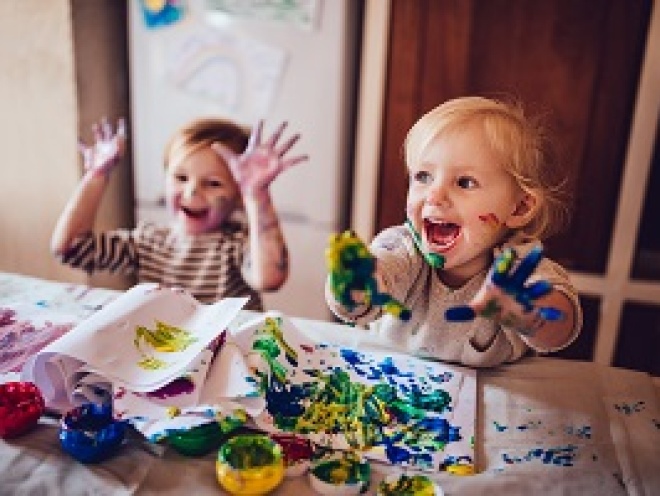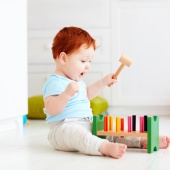What are the best ways to combine fun and learning as your little one continues their march to their 1,000th day on Earth? Here we discuss some of the games and play that can encourage your child’s development.
When did they start saying ‘No’ to everything? By 18 months, your toddler might be ready to run, be putting their teddies to bed and becoming an accomplished (plastic brick) engineer. Here are some ideas for games and toys you can enjoy together and that will help their development.
The most important aspect of play isn’t the toy or game. It’s the person who’s playing it. If your child feels safe and secure, that’s a brilliant basis for developing communication, strong relationships and a thirst to explore (Public Health Agency, 2019).
Dress it up
You might have noticed your child taking an interest in what they – and you – are wearing. It’s easy to make a dressing up wardrobe. You can adapt your old clothes and raid the charity shops. You can also visit an NCT nearly new sale for loads of bargains.
It doesn’t end with the clothes. If you’re getting into dressing up, creating cardboard shields, crowns, hats and swords can be a fun activity for your toddlers to get involved with too.
Art without the mess
Given the right tools, babies can start making their artistic debut at around 12 months (Dunst and Gorman, 2012). If you fancy a break from cleaning up their latest cupboard door masterpiece, try a mess-free alternative.
You could try magic drawing mats, which are activated by water and can give your child a colourful canvas to explore. Most come with a pen but you can also use brushes and sponges.
You could also go for magnetic drawing pads and pens. They use the classic Etch-a-Sketch technology but are easier for toddlers to use.
If you fancy something a bit messy, buy a cheap shower curtain, raid the food cupboard and see what you can make. Try using flour, dried pasta, nuts and dried fruit – there are plenty of would-be art materials in the larder. Spaghetti and lasagne sheets are great fun to scrunch up, FYI.
“When we mixed cornflour with water, I’m not sure who was more excited, me or Adele. When we added food colouring it was literally the best thing ever” Corinne, mum of Adele, aged 18 months
Jigsaws
Simple jigsaws can stretch your child’s problem solving skills and introduce them to a whole host of new things, from colours to animals, to landscapes to numbers. They’re great for eye–hand coordination and they can help improve concentration and memory. They’re also cheap, reusable and a great way to encourage patience and working together.
Housework
OK, not strictly a game, we admit. But parents tell us that making a game out of sorting the washing, sweeping a floor or folding the laundry can actually be fun.
Children love to copy their parents, and putting socks in and out, and in and out (and in and out) of the washing basket. And bonus – it helps them learn about how the world is organised (NSPCC, 2019).
"I wanna be like you ooh ooh"
Now can be a great time to introduce some mini versions of adult objects. From a full fitted kitchen to a hammer and blocks, charity shops and NCT nearly new sales are full of toys that develop motor skills. But don’t forget, a wooden spoon and plastic or metal mixing bowl will still be much loved.
Let’s cook
Pretend cooking can be a real hit. Get that bowl back and mix together dried ingredients (lentils, flour, dried fruit). Lots of children love to mimic what their parents do, so getting them involved in the daily routine can make a fun game from what was a chore.
If you’re feeling adventurous, try mixing in eggs or a bit of water. Playing with fruit can also help them to get used to new tastes and textures and make them less likely to reject new foods (British Nutrition Foundation, 2019).
Tag, tig or catch me
Whatever you call it, chasing after and catching each other is always fun. By 18 months, your toddler may be getting more confident on their feet. Running soon replaces walking, so watch out for some trips and falls. A great way to harness some of this energy is a game of tag.
The chasing element of tag always leaves kids in fits of excitement. It’s also a fun way to learn to stop, start and change direction. Tag is a good way to enjoy time together (ever tried playing tag on your own?). Add in a good tickling session at the end, and this will soon be a favourite game.
Building blocks
Is there anything more satisfying than that first click of two blocks fitting into place? As your child develops more eye–hand coordination, their imagination can be fuelled by the endless possibilities of building up (and breaking apart) a set of bricks.
Playing with bricks has so many developmental benefits too, from mathematics to creativity to self-esteem (Koralek, 2015). And let’s admit it, we love building as much as our toddlers do.
Everything is a game
There’s more to play than toys and games. Literally anything can be a game, given the right approach. From cleaning your teeth together to standing on one leg. Finding the fun in the everyday can turn a chore into a brilliant new experience.
This page was last reviewed in April 2019.
Further information
Our support line offers practical and emotional support with feeding your baby and general enquiries for parents, members and volunteers: 0300 330 0700.
You might find attending one of our NCT New Baby groups helpful as they give you the opportunity to explore different approaches to important parenting issues with a qualified group leader and other new parents in your area.
Make friends with other parents-to-be and new parents in your local area for support and friendship by seeing what NCT activities are happening nearby.
Child development charity Zero to Three has lots of great ideas for keeping the kids amused and developing their brains and bodies.
Koralek D. (2015) Ten things children learn from block play. Young Children. 70(1). Available from: https://www.naeyc.org/resources/pubs/yc/mar2015/ten-things-children-learn-block-play [Accessed 2nd April 2019].
British Nutrition Foundation. (2019) Introducing solid foods to your baby. Available from: https://www.nutrition.org.uk/healthyliving/nutrition4baby.html [Accessed 2nd April 2019].
Dunst C, Gorman E. (2009) Development of infant and toddler mark making and scribbling. Centre for Early Literacy Learning Reviews. 2(2). Available from: http://citeseerx.ist.psu.edu/viewdoc/download?doi=10.1.1.662.1578&rep=r… [last accessed 2nd April 2019]
NSPCC. (2019) Look say sing play. Available from: https://www.nspcc.org.uk/preventing-abuse/keeping-children-safe/look-say-sing-play/ [Accessed 2nd April 2019].
Public Health Agency. (2019) Birth to five. Available from: https://www.publichealth.hscni.net/publications/birth-five [Accessed 2nd April 2019].







